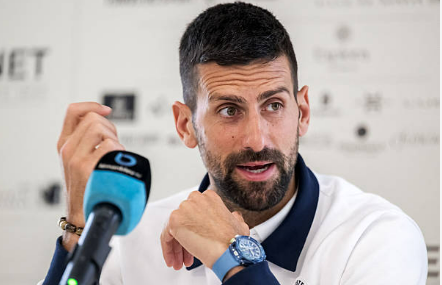Over the last couple of years, tennis players are speaking out more and more around their mental health. It seems like every week, a top player is opening up about their life, or taking some time away from the sport.
Below is just a sample of what players have been saying in recent years. Keep in mind, these are the players who are high-profile. If we interviewed players from the Challenger Tour and the ITF Tour, where things like finances are so critical, we would probably find a lot more cases.
This is sadly, far from a definitive list.
Goran Ivanisevic, a former player and coach, observed the widespread impact of these struggles, stating, “When I listen to players, everyone’s on antidepressants.” His comment may have been brushed under the carpet as ‘gross exaggeration’ a few years back, and while ‘everyone’ may still be adding a little mayo to the comment, I think everyone understands that it is becoming far more widespread.
Alexander Zverev has been vocal about his feelings of isolation, saying,
“I feel very alone out there at times. I struggle. Mentally, I’ve been saying that I’ve struggled since after the Australian Open. Just don’t know. Trying to find ways to get out of this hole. I keep finding myself back in it. I feel generally speaking quite alone in life at the moment, which is a feeling that is not very nice.”
He further elaborated, “I’ve been through a lot of difficulties in the media and in life generally. I’ve never felt this empty before. Just lacking joy in everything that I do. It’s not necessarily about tennis. Just lacking joy outside of tennis as well.”
Similarly, Stefanos Tsitsipas described 2024 as a low point, sharing, “2024 was very difficult, and probably the worst year emotionally, but also mentally, that I went through and endured in my career. It was very difficult. (I don’t want to) have moments where I step on to the tennis court feeling awful.”
Andrey Rublev revealed the intensity of his struggles after a recent loss, saying,
“That was the worst moment that I face about myself. It was not about tennis. It was to do with myself, like after that moment I don’t see the reason of living life. Like, what for? This sounds a bit too dramatic but the thoughts inside my head were just killing me, creating a lot of anxiety, and I couldn’t handle this any more. I start to have a bit of bipolar.”
He added, “Since Wimbledon some things changed. I was taking anti-depression tablets and it was not helping at all. In the end I said: ‘I don’t want to take anything any more.’ I stopped all the tablets and Marat Safin helped me a lot with conversation.”
Rublev’s work with a psychologist marked a turning point: “He made me realize many things and then I start to work with a psychologist. I learn a lot about myself and while I don’t feel in a happy mood or the happy place I would like to be I don’t feel any more that crazy anxiety and stress of not understanding what to do with my life.”
Carlos Alcaraz, despite finding joy in the game, acknowledged its challenges, saying, “I’ve felt down a lot of times on the court and in tournaments. I’m just really happy to have found the right path again and such good joy on the court. For me, it is not about winning or losing.
For me it’s about having fun playing tennis, have fun stepping on court. Not thinking about the result. It’s just living the moment. Here at Wimbledon for me it’s a gift. Every match I’m playing is a gift. I’m trying to make the most of it. Trying to enjoy as much as I can. Sometimes it’s really difficult. I know.”
Emil Ruusuvuori described a profound sense of detachment on a recent podcast: “Even when I won, it didn’t matter. I didn’t care. There was just… nothing. It’s hard to explain. People say you’re living the dream, but it felt like hell.”
He added, “Life didn’t matter anymore. I had to re-learn how to live. How to feel. I needed to remember who I was without the racquet.”
Ons Jabeur, who recently stepped away from the sport, posted on social media, “For the past 2 years I’ve been pushing myself so hard, fighting through injuries, and facing many challenges. But deep down, I haven’t truly felt happy on the court for quite some time now. Tennis is such a beautiful sport. But right now, I feel it’s time to take a step back, and finally put myself first: to breathe, to heal, and finally re-discover the joy of simply living.”
Amanda Anisimova famously took time away after a number of personal challenges, and emphasized the importance of mental health, noting, “You can struggle with your mental health. It’s just as important as your physical health. Especially when it comes to sports and pursuing this as a career. The lifestyle can be different if you don’t find that right balance. It can get lonely at times. We’ve seen a lot of players struggle with that.”
Emma Raducanu highlighted the mental demands of the sport, saying, “It’s a mentally very challenging sport. I think for me, what I’ve found, is trying to surround yourself with good people.. trying to win the day.. trying to focus on the process as much as possible.
I think the results, it’s really difficult to kind of take your joy from the results. Because it’s so up and down. It’s a rollercoaster. So trying to enjoy and think ‘Did I get 1% better today? Or did I maintain today?’ Because maintaining as well is a big skill. If you don’t do the right work, you can easily slip. Trying to maintain or at least get a bit better is the goal that I have, at least.”
Aryna Sabalenka stressed the value of therapy, sharing, “I had a therapist for like 5 years. It’s really important to be open and talk about whatever you’re experiencing. If you’re gonna keep it inside, it’s just gonna destroy you. The moment you start to talk about your problems, you start realizing a lot of things. It helps to solve them.”
In an interview with journalist Sasa Ozmo, Novak Djokovic pointed to broader systemic pressures, stating, “Social media is extremely present and largely dictates the mood and daily rhythm of an athlete. In my opinion, that kids are pushed too early into strict professionalism, before they’ve developed emotional intelligence, which is part of psychological preparation for life. It’s a vicious circle, and if a player gets a bit lost in that, it can strongly affect their psyche and how they live their life.”
He added, “Tennis has the longest season of all global sports. For most who play the full schedule, it’s from January 1 to late November. Other sports have more competitions now too, but tennis is individual — there are no substitutes, no ‘I don’t feel good today, can you sub in for me for five minutes so I can rest’… Here, every point matters, every day matters. If you want to reach the highest heights, you have to transform your entire life in service of tennis and sport. You lose yourself, it’s too big of a bite for most.”
Ashleigh Barty reflected on her own breaking point in her autobiography, recalling, “I remember standing on that court in the Netherlands, weeping every time I hit a winner, and sighing with relief every time I hit the net, or pushed the ball wide. My dreams of success were getting mixed up with a desire to fail – to get off the court, pack my bags, and fly home, and never leave home again. That was when I knew I wasn’t meant for this life.”
Casper Ruud has been very vocal this year, saying, “There’s a lot of things you deal with as a player. There are some things you keep to yourself, especially when it comes to certain pain and things we deal with. There’s probably a bit more than the fans hear about.”
Additionally, “I’ve been kind of feeling not great mentally this year. But I’ve sought help, which has really worked for me, and I’ve been feeling [a] quick response and feeling a lot better.”
Nick Kyrgios shared a harrowing account of his struggles, saying, “I won tournaments on the professional tour (but was still) drinking every night, self-harming, burning things on my arm, cutting myself for fun. It became an addiction of pain. I hated myself. I hated waking up and being Nick Kyrgios.”
This is just a mere snapshot of a very small percentage of players, admitting to the struggles of the tour, and life itself. Tennis is a very lonely and solitary sport, requiring more mental strength than most sports, due to the travel, the length of the schedule, the physical requirements, time away from home, and many more reasons.
As a sport, tennis has to find a way to make the pathway enticing for young kids, and their parents. The more we hear from these athletes, the less attractive tennis may become to the next generation.
And this is just the tip of the iceberg…
Read more of our exclusive feature articles here.
Follow The Tennis Site on Facebook and X: @thetennissite
Follow Todd Scoullar on X: @toddscoullar


Comments are closed, but trackbacks and pingbacks are open.